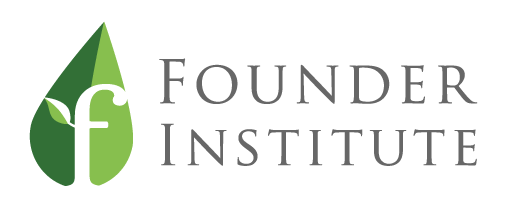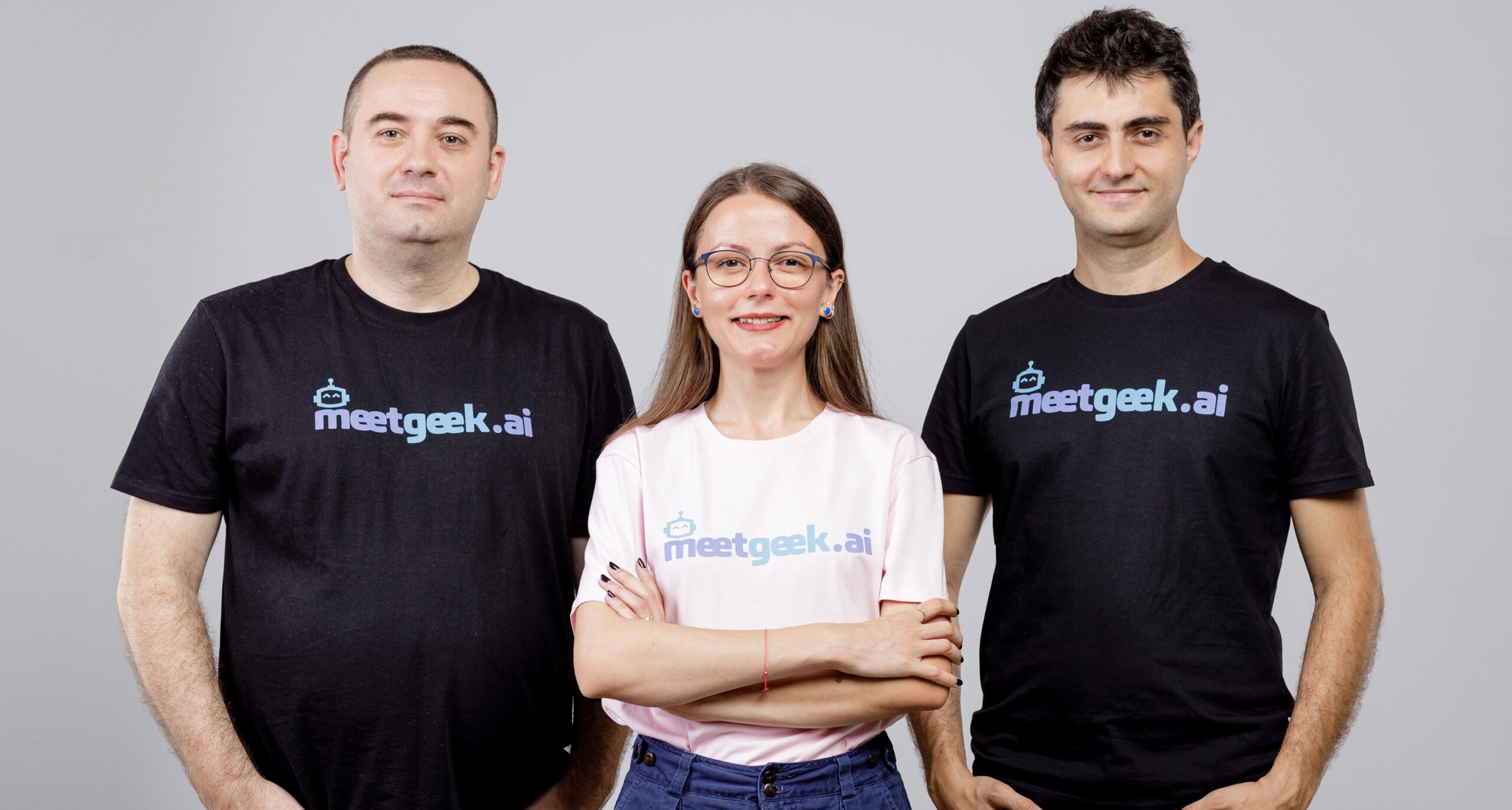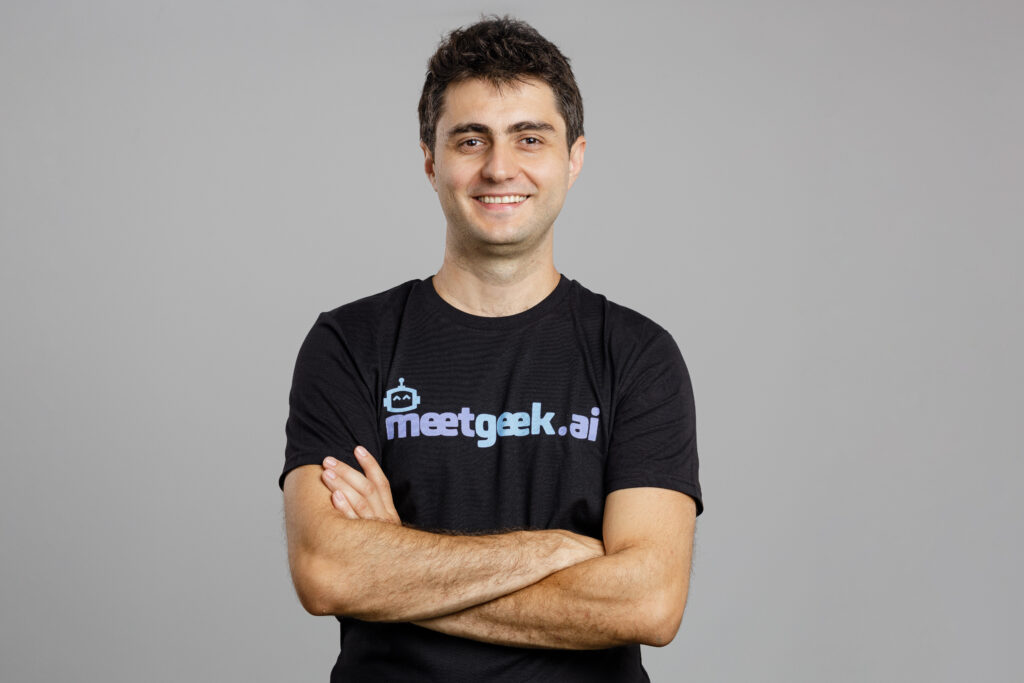Meet Dan Huru from MeetGeek
Q: Could you introduce yourself and tell us about MeetGeek?
A: I’m Dan Huru, CEO and co-founder of MeetGeek. My professional background is deeply rooted in engineering. I’ve worked as a software engineer and later as a manager in several large companies, focusing mainly on product development. My expertise lies in leading teams to develop software automation products. Additionally, I hold a PhD in AI, which significantly influences my work at MeetGeek. At MeetGeek, we’re leveraging my AI and software engineering background to innovate in the meeting software space. We aim to simplify and enhance the experience of managing and conducting meetings, integrating advanced technologies to make the process more efficient and productive. My journey from a software engineer to a startup CEO reflects the evolution and application of my skills in a way that addresses real-world needs in the corporate environment.
Q: What was the inspiration behind the creation of MeetGeek?
A: The idea for MeetGeek emerged while working in automation, specifically while developing products for automating operational tasks. We frequently evaluated how much time various departments and teams wasted on repetitive, manual tasks. Through this analysis, it became evident that inefficient meetings were a significant part of the problem in many companies. This realization sparked the initial concept for MeetGeek. We recognized the vast potential for improvement in the meeting space – an area ripe for innovation. The aim was to create software that not only complements the learning process of conducting effective meetings but also helps extract vital information from these meetings. MeetGeek is designed to be a complementary tool, acknowledging that changing habits, particularly in a corporate setting, is challenging. For instance, a middle manager might learn new meeting management techniques from a course, a book, or online resources. However, applying these techniques and maintaining them over time can be difficult. People often revert to their old ways of handling meetings.
Therefore, MeetGeek is an essential tool for supporting and reinforcing these new habits. It’s not just about learning how to conduct meetings more effectively but also having a software solution that helps sustain and enforce these improvements in the long run. This focus on complementing and reinforcing better meeting practices is at the heart of MeetGeek’s mission.
Choosing Founder Institute
Q: Why did you choose Founder Institute as the accelerator for your startup?
A: My decision to join the Founder Institute was influenced by my background and needs at the time. Previously, I had worked for large corporations and hadn’t ventured into the startup world. I lacked a network in the startup community and needed a platform to connect with mentors, investors, and other startup enthusiasts. Founder Institute represented a launchpad for me – a place where I could take an idea from paper to a validated concept with the help of experienced mentors.
During my time in the program, I also brought in my co-founders to collaborate on the idea. The structure of the Founder Institute, with its schedule and homework assignments, was particularly beneficial for me as a first-time founder. It provided the discipline and framework necessary to progress from an idea to a tangible business model. If I were to start over, I might choose a different path now that I have more experience and connections. But for someone in my position at the time – transitioning from a corporate job to entrepreneurship without a strong startup network – the Founder Institute was an invaluable starting point. It was a significant leap of faith, quitting a stable job to pursue a startup dream. The opportunity to discuss, exchange ideas, and get feedback in such an environment was crucial for the early stages of developing MeetGeek.
How a Founder Gets In
Q: Can you describe your experience with the application process at the Founder Institute?
A: The application process for the Founder Institute, as I recall, was fairly straightforward but insightful. It involved filling out a form with a series of questions designed to assess your suitability as a potential founder. The questions aimed to evaluate both your psychological readiness and technical capabilities to determine if you were a good fit for the program.
In terms of interviews, I don’t remember it being an extensive process. It was mainly the form I filled out. I’m not certain about the number of applicants or the rejection rate at that time. However, what stood out during the program was its rigorous nature. Even after being accepted, many participants dropped out over the course of the three to four months due to its demanding nature. Balancing a full-time job with the program’s assignments was particularly challenging. The workload was significant, requiring us to prioritize what was essential for our startup’s development. This intensity led to a natural, albeit tough, selection process among the founders. Some realized that the startup path wasn’t right for them, either at that moment or in general.
This aspect of the Founder Institute was, in my view, a practical way to test one’s commitment and readiness to start and run a business. It was a real test of whether you’re prepared to handle the challenges and demands of being an entrepreneur. For me, it was a valuable experience that helped shape my approach and commitment to MeetGeek.
Team Dynamics and Culture in the Founder Institute Cohort
Q: Can you describe the team dynamics and the overall culture within your Founder Institute cohort?
A: My experience at the Founder Institute in 2020, which might be slightly different now, was a blend of individual and team dynamics. The program included both individual assignments and team-based projects. We were grouped with other participants, and often one person within the group would take on a leadership role, overseeing the completion of assignments and ensuring everyone was on track. This structure fostered a sense of teamwork, even though many of the assignments were completed individually. In terms of the cohort’s culture and composition, there was a considerable diversity in backgrounds. Some participants, like me, came from the corporate world and were new to the startup environment. Others had previous business experience or were already running businesses and joined the program to validate new ideas or strategies. A significant portion of our cohort, around 30%, had a background in IT. This diversity created a rich learning environment as we brought different perspectives and skills to the table. Working in such a varied group helped me understand different business and product development approaches. Overall, the mix of individual work and team collaboration, along with the diverse backgrounds of the participants, contributed to a dynamic and enriching experience at the Founder Institute.
Understanding Funding and Support in the Founder Institute
Q: Does the Founder Institute provide funding to startups in the program?
A: The Founder Institute does not offer direct funding to startups in its program. Instead, their primary focus is on providing the program itself, which is rich in educational content, mentorship, and ongoing support. The value they offer lies more in the resources and guidance they provide, rather than financial investment. One significant benefit of the program is access to a comprehensive set of resources. For instance, they provide templates for investment documents, contract agreements, and other legal and business essentials. These templates are time-tested and validated, offering a robust starting point for various aspects of running a startup. This kind of support is incredibly valuable for new founders who may not have experience or knowledge in these areas. While direct funding isn’t part of the package, the program does facilitate connections with potential investors. In our case, we met our first investor through the Founder Institute. This networking aspect is a crucial component of the program, offering startups the opportunity to secure funding through the relationships they build within the Founder Institute’s network.
The Standout Feature of the Founder Institute Program
Q: What would you say was a standout feature of the Founder Institute program?
A: A standout feature of the Founder Institute, from my experience, was definitely the Quickfire pitches. This aspect of the program was particularly beneficial, especially in the early stages of developing an idea. Each week, participants were required to pitch their ideas in front of an audience. This wasn’t done online, but face-to-face, which added an element of challenge and realism. Standing in front of a crowd and presenting your idea forces you to refine your pitch, think on your feet, and respond to immediate feedback. This regular practice was invaluable in honing our pitching skills and progressively improving our presentation each week. It also helped us to test and validate our idea in a more dynamic and interactive setting.
This consistent pitching exercise provided a platform to articulate our vision clearly and confidently, which is a crucial skill for any entrepreneur. The ability to effectively communicate your idea is essential, not just for attracting investors, but also for engaging potential customers and partners. Therefore, the Quickfire pitches were an integral part of the learning and development process at the Founder Institute.
Areas for Improvement in the Founder Institute Program
Q: Were there aspects of the Founder Institute program that you found underwhelming or that could be improved?
A: Overall, my experience with the Founder Institute was positive, particularly regarding the quality of people involved in the program. The program organizers did a commendable job of bringing in valuable individuals who were genuinely interested in startups, not just as speakers or consultants, but as engaged participants in the program. This engagement is crucial as it fosters a more interactive and beneficial learning environment. However, like any accelerator, there’s always room for improvement. There is potential to bring in more individuals who are actively running businesses. These are people who have navigated the challenges that founders typically face and can provide practical, real-world advice.
Having more entrepreneurs and business owners, as opposed to just popular speakers or consultants, would add greater depth to the learning experience. Their insights and experiences are directly applicable to what founders go through and can provide more actionable advice.
It’s also important to note that my experience with the Founder Institute stands out more than that of other accelerators, where the engagement and relevance of speakers and mentors may not be as strong.
The Impact of Founder Institute on MeetGeek’s Success
Q: How significant was the role of the Founder Institute in the success of MeetGeek?
A: As a first-time founder, the Founder Institute was undeniably valuable. It played a critical role at the initial stage of MeetGeek’s journey. Although they take a share of equity, the experience, knowledge, and network gained from the program were well worth it. I believe that the decision to join might differ for someone already experienced in founding a company, but for beginners, it’s definitely advantageous.
As for MeetGeek’s growth trajectory since completing the program, it’s important to note that the Founder Institute was a part of our story for only about three to four months at the very beginning. Since then, MeetGeek has been growing and evolving independently for almost four years. The initial boost we received from the Founder Institute, particularly in terms of networking and finding our first beta users, was crucial.
I leveraged the FI network to reach out to potential users beyond my immediate circle, which allowed us to go global from the start. This approach was instrumental in getting feedback on our beta app from users across different countries. While our involvement with the Founder Institute was relatively brief, the impact of that early stage support and the global network access they provided was significant in setting the foundation for MeetGeek’s growth and development.
Ongoing Support from Founder Institute Post-Program
Q: How has your relationship with the Founder Institute evolved since completing the program, particularly in terms of support and networking?
A: Our relationship with the Founder Institute remains positive and mutually beneficial. They are a part of our cap table, and we’ve maintained a good connection with them. The support from the Founder Institute continues, but it’s important to understand the nature of this support. The key here is proactive engagement from our side. The Founder Institute isn’t going to automatically do the work for you. As a founder, you need to be clear about what you need and actively seek it out. Whenever we’ve required assistance or specific resources, we’ve made it a point to ask for it. This approach has been effective for us.
In terms of introductions and networking, the Founder Institute has been helpful, but again, much of this comes down to how much you, as a founder, are willing to reach out and utilize the network. They have a wide network, including venture capital firms and angel investors, but leveraging this network requires initiative from the founder’s side. Our experience has been that when we’ve asked for help or introductions, the Founder Institute has been supportive and responsive. This ongoing relationship is an essential part of the post-program experience and has contributed to our continued growth and development.
Advice for Aspiring Entrepreneurs Considering Accelerators
Q: What advice would you offer to those considering applying to the Founder Institute or similar programs?
A: My advice, particularly for first-time founders who lack a robust network or extensive experience in the startup ecosystem, is to consider seriously applying to an accelerator like the Founder Institute. If you’re contemplating starting a company but feel you’re missing key connections or industry insights, an accelerator can be a valuable resource. From my experience, the Founder Institute is a solid choice for those at the beginning of their entrepreneurial journey. It provides a structured environment to develop your idea, along with access to a network of mentors, investors, and fellow entrepreneurs. This support can be crucial in navigating the early challenges of starting a business While I don’t have personal experience with other accelerators to make a direct comparison, I recommend exploring various options, The key is to find an accelerator that feels like the right fit for you and your startup’s vision. As always, do your research, understand what each program offers, and assess how that aligns with where you want to take your startup.


